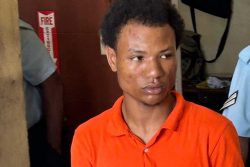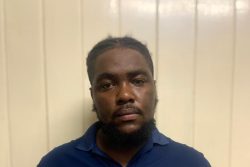The Caribbean Court of Justice (CCJ) yesterday dismissed an application made on behalf of murder accused United States resident Marcus Bisram for an urgent hearing of a challenge to a local judge’s refusal to discontinue the charge against him.
“We are disappointed that the court decided to go the way it did. We haven’t seen the reasons for the decision of the court as yet… we find the decision difficult in the circumstances where the DPP [Director of Public Prosecutions] is obliged to exercise the decision to charge only when there is evidence that can lead to a conviction. That is well established in law…,” attorney Sanjeev Datadin told the Stabroek News in an invited comment following the decision.
Bisram, who is charged with ordering the murder of Number 70 Village carpenter Faiyaz Narinedatt, is also fighting the extradition order issued in the United States by Judge Peggy Kuo. He was nabbed in the United States on July 16th last year.
Police here have alleged that he procured and commanded Orlando Dickie, Radesh Motie, Diodath Datt, Harri Paul Parsram, and Niran Yacoob to murder Narinedatt between October 31st and Novem-ber 1st, 2016, at Number 70 Village, Berbice.
After confirming the dismissal of the application, which was filed on August 2nd through Bisram’s mother, Shermella Inderjali, Datadin told this newspaper that “the court recognises that what we have said has merit but we have to raise it in the criminal proceedings.”
Datadin stated that the court’s view was “unfortunate,” especially when the position “creates such hardship.” He maintained that the DPP should be held accountable for the decision she makes and that citizens “shouldn’t be charged when there is clearly no proper evidence against them.”
He said that taking the case to the Human Rights Tribunal would not be wise to pursue as it would be “non-binding.”
Inderjali, in her application, asked the Trinidad-based CCJ to grant three orders: an order that the time to be fixed for the hearing of the application be abridged; an order granting special leave to appeal against the decision of the Guyana Court of Appeal (GCA) made on 31st July, 2018; and an order treating the application for special leave to appeal as the hearing of the appeal against the decision of the GCA.
Justice of Appeal Arif Bulkan, who read a 16-page decision constructed by himself and Justices of Appeal Rishi Persaud and Rafiq Khan SC, had said in the July ruling that an application before High Court judge Navindra Singh was the third of its kind seeking broadly similar reliefs. Those orders essentially sought from the High Court orders to compel the DPP to discontinue the prosecution against Bisram.
This fact, the Justice of Appeal noted, was not frontally disclosed and therefore rendered a re-hearing before a differently constituted panel of judges. This also was apparently not disclosed in another matter and led to its dismissal for material non-disclosure. The judges concluded that the repeated litigation was undeniably an abuse of the court’s process, and for that reason alone ought to disentitle the applicant from the relief sought in the motion. They also noted that the repeated litigation possibly demonstrates the lack of merit of the substantive appeal. It was pointed out, too, that at each development in the matter, the applicant seemed to file another application, so that the picture before the court had been unfolding in a piecemeal fashion.
It was also made clear that Bisram ought not to be given preferential treatment as there are hundreds of murder accused who have cases pending before the court.
The CCJ application, which was prepared by attorneys Datadin, Ganesh Hira, Ryan Crawford and Siand Dhurjon, listed Inderjali as the applicant and next friend of Bisram and the DPP as the respondent.
The court informed that after reading the Notice of Application for Special Leave and Affidavit in Support of the applicant and after reviewing all written and supplemental submissions filed by both parties thereafter, it ordered that the application be dismissed. Both Datadin and Senior State Counsel Stacy Goodings were informed of the decision yesterday.
Inderjali, in her affidavit in support of the application, said that the DPP caused charges to be instituted against Bisram based on the evidence of Chaman Chunilall only. “No other admissible material that may be constructed as adverse evidence to Bisram has been disclosed to date,” she charged.
She said her attorney, acting on her behalf, wrote two letters to the DPP in November, 2017, informing of the sworn evidence of the witness recanting the original statement allegedly given to the police and “seeking that she exercise her discretion to review the charges against Bisram with a view to discontinuing same.” According to her, only one response was received and it contained “a bare denial without more.”
She also made mention of a complaint made by the DPP, which led to the removal of the magistrate hearing the matter. Subsequently the preliminary inquiry commenced “de novo” before another magistrate. This was the doing of the Judicial Service Commission, which Inderjali said had no such lawful authority.
The applicant also charged that the DPP failed to take steps to prevent the reporting of “wild speculation” in the media and that such an omission, in violation of her duties and obligations, permits and encourages the “continuation of hopeless prosecution of Bisram and the prosecution is now almost entirely driven by public sentiment and not facts or evidence.”
After pointing out the High Court’s refusal on two occasions to have the criminal charge quashed, she said that she was advised that the DPP “has a duty to commence and continue only prosecutions that can yield a ‘reasonable prospect of conviction.’ The DPP has a corresponding duty to discontinue all prosecutions that cannot yield a ‘reasonable prospect of a conviction.’”
The continuation of the charges against her son, she stressed, “is an abuse of process and an abuse of authority by the DPP.”







